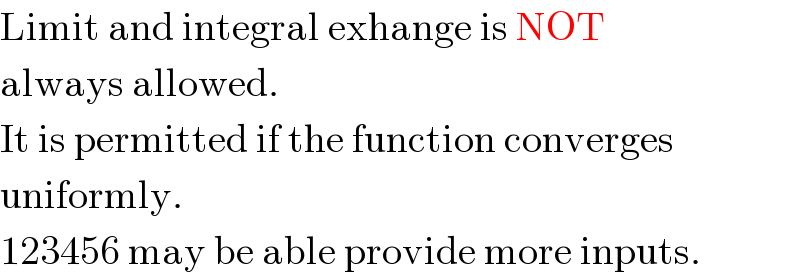Question Number 8628 by sou1618 last updated on 18/Oct/16
![is it always satisfying? A=lim[n→∞]∫f(n,x)dx B=∫lim[n→∞]f(n,x)dx A=B?? please show counter example checking (1) f(n,x)=x^n ,x[0→1] A=lim_(n→∞) ∫_0 ^1 x^n dx=lim_(n→∞) (1/(n+1))x^(n+1) =0 B=∫_0 ^1 lim_(n→∞) x^n dx=∫_0 ^1 0dx=0 so A=B (2) f(n,x)=(1+(x/n))^n A=lim_(n→∞) ∫(1+(x/n))^n dx =lim_(n→∞) (n/((n+1)))(1+(x/n))^(n+1) =e^x B=∫lim_(n→∞) (1+(x/n))^n dx =∫e^x dx =e^x so A=B . . .](https://www.tinkutara.com/question/Q8628.png)
$${is}\:{it}\:{always}\:{satisfying}? \\ $$$$\boldsymbol{{A}}=\mathrm{lim}\left[{n}\rightarrow\infty\right]\int{f}\left({n},{x}\right){dx} \\ $$$$\boldsymbol{{B}}=\int\mathrm{lim}\left[{n}\rightarrow\infty\right]{f}\left({n},{x}\right){dx} \\ $$$${A}={B}?? \\ $$$${please}\:{show}\:{counter}\:{example} \\ $$$$ \\ $$$$ \\ $$$${checking} \\ $$$$\left(\mathrm{1}\right) \\ $$$${f}\left({n},{x}\right)={x}^{{n}} \:\:,{x}\left[\mathrm{0}\rightarrow\mathrm{1}\right] \\ $$$${A}={lim}_{{n}\rightarrow\infty} \int_{\mathrm{0}} ^{\mathrm{1}} {x}^{{n}} {dx}={lim}_{{n}\rightarrow\infty} \frac{\mathrm{1}}{{n}+\mathrm{1}}{x}^{{n}+\mathrm{1}} =\mathrm{0} \\ $$$${B}=\int_{\mathrm{0}} ^{\mathrm{1}} {lim}_{{n}\rightarrow\infty} {x}^{{n}} {dx}=\int_{\mathrm{0}} ^{\mathrm{1}} \mathrm{0}{dx}=\mathrm{0} \\ $$$${so}\:\:{A}={B} \\ $$$$ \\ $$$$\left(\mathrm{2}\right) \\ $$$${f}\left({n},{x}\right)=\left(\mathrm{1}+\frac{{x}}{{n}}\right)^{{n}} \\ $$$${A}={lim}_{{n}\rightarrow\infty} \int\left(\mathrm{1}+\frac{{x}}{{n}}\right)^{{n}} {dx} \\ $$$$\:\:={lim}_{{n}\rightarrow\infty} \frac{{n}}{\left({n}+\mathrm{1}\right)}\left(\mathrm{1}+\frac{{x}}{{n}}\right)^{{n}+\mathrm{1}} \\ $$$$\:\:={e}^{{x}} \\ $$$${B}=\int{lim}_{{n}\rightarrow\infty} \left(\mathrm{1}+\frac{{x}}{{n}}\right)^{{n}} {dx} \\ $$$$\:\:=\int{e}^{{x}} {dx} \\ $$$$\:\:={e}^{{x}} \\ $$$${so}\:\:{A}={B} \\ $$$$ \\ $$$$.\:.\:. \\ $$
Answered by prakash jain last updated on 18/Oct/16

$$\mathrm{Limit}\:\mathrm{and}\:\mathrm{integral}\:\mathrm{exhange}\:\mathrm{is}\:\mathrm{NOT} \\ $$$$\mathrm{always}\:\mathrm{allowed}. \\ $$$$\mathrm{It}\:\mathrm{is}\:\mathrm{permitted}\:\mathrm{if}\:\mathrm{the}\:\mathrm{function}\:\mathrm{converges} \\ $$$$\mathrm{uniformly}. \\ $$$$\mathrm{123456}\:\mathrm{may}\:\mathrm{be}\:\mathrm{able}\:\mathrm{provide}\:\mathrm{more}\:\mathrm{inputs}. \\ $$
Commented by sou1618 last updated on 19/Oct/16

$${thanks}. \\ $$$$ \\ $$
